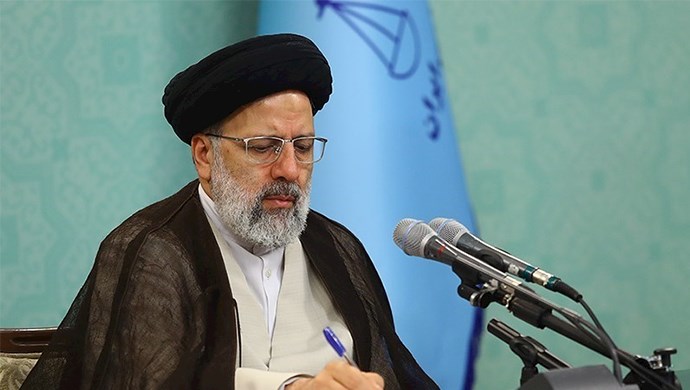Reporting by PMOI/MEK
Iran, June 24, 2020—The past weeks have seen an escalating series of controversies surrounding the financial corruption of the Iranian regime’s judiciary, the body that is ostensibly charged with cracking down on financial crime. The ongoing criminal trial of Akbar Tabari, the former executive deputy of previous judiciary chief Sadegh Amoli Larijani, and a dozen other regime insiders and officials, and the recent mysterious death of Gholamreza Mansouri, one of the suspects in the case, has caused much commotion about what is going on in the judiciary.
In response, Ebrahim Raisi, the current head of the regime’s judiciary, participated in a television program in an attempt to address the controversies. The expectation was that Raisi would, at least in appearance, take a strong stance on corruption in order to vindicate himself.
But in effect, his remarks turned out to be a feeble attempt at whitewashing and justifying the corruption that plagues the judiciary and every other organ of the regime. “This is an exception,” Raisi said in reference to the Tabari case.
On questions regarding 63 bank accounts that belong to the judiciary, a subject that has caused much outrage among the people, Raisi said, “Some are taking advantage of issues surrounding these accounts for political reasons… We reported, and we did nothing wrong… It just became clear where the money comes from, how much it is, and where it’s being spent.”
The 63 undisclosed bank accounts came to light during the tenure of Larijani in 2016 and became the subject of much debate regarding corruption in the judiciary. But Raisi didn’t even bother criticizing his predecessor.
The program’s host also asked why of 125 judges who were dismissed from the judiciary, only one of them was given a public trial. Again, Raisi sidestepped the matter and claimed that there were no criminal charges against the dismissed judges, which means they weren’t involved in bribery and theft.
Even regarding the privatization of public assets and companies, which has caused severe damage to Iran’s economy in the past years, Raisi remained largely silent and did not reveal anything that hasn’t been said in the media or any new policies or roadmaps. He sufficed by laying the blame on the executive branch, led by regime president Hassan Rouhani.
What was the aim of Raisi’s interview?
Raisi’s remarks clearly show the dire straights that the regime has found itself in. A recurring theme in the regime is that officials try to pretend fighting financial crime and take the lid off corruption cases, but they end up digging themselves into a hole. Investigations open up a Pandora’s box of cases that inevitably trace back to high-profile officials and the regime’s top leader, Ali Khamenei.
In the beginning, it seemed that Khamenei was going to use Larijani as a scapegoat to whitewash the regime and later present Raisi as a strong figure who will clamp down on government corruption. But Raisi’s weak remarks show that his leader is in no position to take such action because he’s waist-deep in corruption himself.
Previously, when Mohammad Yazdi, the Speaker of the Assembly of Experts, had attacked Larijani on the judiciary’s corruption (on cue from Khamenei no doubt), the latter had threatened: “My chest is filled with the secrets of the establishment.” That single remark caused Yazdi (again, at the behest of Khamenei) to back down, further hinting at the nature of those "secrets."
Another reason for Raisi’s hasted remarks is the sudden death of Mansouri, who was supposedly on his way back from Romania to stand trial for his corruption charges, including a 500,000-euro bribe. While it still isn’t clear by who and how he was killed, it is obvious that some very large interests were at stake that prompted his assassination in a foreign country, even though it would entail very high diplomatic and political risks for the regime. Interestingly, Raisi, who preached abundantly about transparency in his interview with the state-run television, didn’t say a word about Mansouri, who had occupied different positions in the judiciary for 30 years.
These developments come at a time where public outrage against the regime for corruption, mishandling the coronavirus outbreak, and squandering the country’s riches on destructive agendas is at an all-time high. It is thus that Khamenei’s attempt to put up a show of fighting corruption backfired against himself and his cronies. Raisi’s remarks only made the matter worse by showing the regime has even more to hide.





